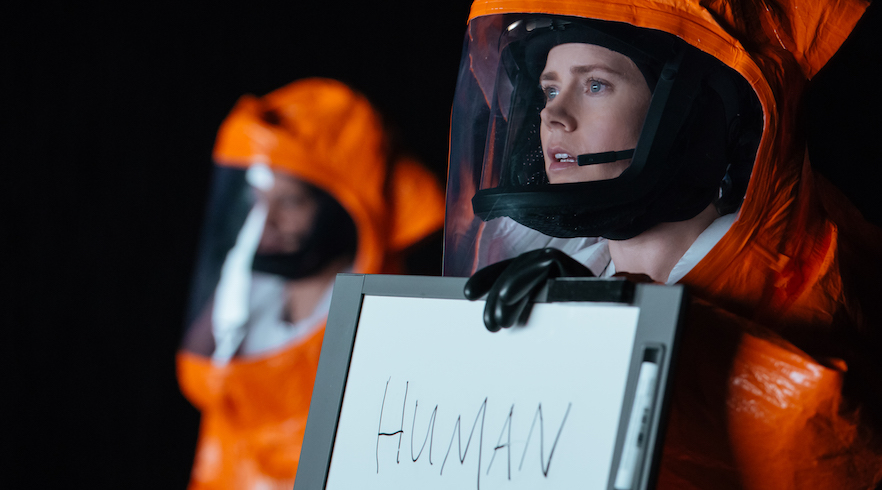‘Arrival’ They arrive à la the no-goodnik E.T.s in “Independence Day.” One day there they all are: a fleet of ships from another world that look like floating contact lenses, hanging over a dozen-or-so key locations across our planet. Maybe their inhabitants are only playing nice before annihilating us, like the cheeky destructos of “Mars Attacks!” But the film’s tone assures us that’s unlikely. Brainy yet expensive, “Arrival” flaunts its hope to be more like “Close Encounters of the Third Kind”: slow, measured and filled with moments where the audience is supposed to collectively hush, open their jaws in unison and go awe. RELATED: Interview: Paul Schrader on “Dog Eat Dog” and how Nicolas Cage only wants you to think he’s crazy It’s not, however, as gee-whiz as “Close Encounters” — but then, this is 2016. Turns out our alien visitors have come to talk. Thing is, neither side knows how to do that. Because it’s been released into the Age of Trump, our hero, of course, is a linguist. Amy Adams plays Dr. Louise Banks, awoken in the middle of the night and plucked from her boring job of teaching classes and writing books to play global savior. Teamed with a scientist (Jeremy Renner), the two are tasked with figuring what the hell our new guests, who look like hands with tentacles for fingers, are trying to say. That involves decoding not their speech, which sounds like an army of didgeridoos, but their written language: circular splotches that resemble a marriage of Rorschach tests with Spirograph doodles. Yes, “Arrival” is the kind of $50 million sci-fi movie where our heroes debate the Sapir-Whorf theory of language. It’s also the kind of movie that doesn’t mention that by name. To the makers of “Arrival,” the portion of the audience that hates intelligence and experts and especially journalists might as well be the alien race: a group with whom they must divine an avenue of communication. It doesn’t dumb things down so much as find a way to make grammar arguments thrilling. A discussion of whether our potential alien overlords said “weapon” but actually might have meant “tool” is a lot more goosebumpy when humanity’s fate is in the balance. After all, the globe’s already tetchy, reliably short-sighted military powers are itching to pick a fight with an “enemy” who could probably flatten humanity like Godzilla would Bambi. (Insert another deflated Trump joke here.) There’s another factor to ease the masses in: It’s the latest from Denis Villeneuve. Over the last three years, the Canadian filmmaker has gone from an art house fave — his “Incendies” was nominated for the Foreign Language Oscar in 2011 — to maker of atmospheric crossovers, like “Prisoners” and “Sicario.” Villeneuve is hard to classify: He makes bold and sinister images with the ease with which Hitchcock made thrilling set pieces, but he’s as good with actors as he is with mood. He’s not always a man of deep thought — “Prisoners” is certainly not enjoyable because the story makes sense — but he’s someone whose style allows for profundity, should the screenplay provide it. “Arrival” is thus, as they say, a film of ideas, but not so many that they subtract from the sense of wonder. Villeneuve captures the feeling of being alongside two people as they patiently try to make contact. He allows each scene between the aliens and humans to play out with nervous anticipation. When they’re done trying to hash it out, he throws us into busy rooms where people speed-talk over top each other, a la screwball comedy characters, struggling to suss out what they’ve learned, if anything, and whether it’s good or bad for earthlings. “Arrival” is heavy and menacing, but it isn’t humorless; there are a couple actual jokes, including a decent Sheena Easton one, and one plot development seems like a nudgy gag at the idea that Hollywood makes movies with one eye on audiences in China. Whether or not the twist climax holds scientific water or not is something we’ll leave to Neil deGrasse Tyson or a killjoy Slate article (“What movie x gets wrong about y!”). Still, its simplicity does take some of the air out of the build-up — while allowing Villeneuve to make a sci-fi epic that has more in common with Alain Resnais or Jean-Luc Godard than even someone like Stanley Kubrick. Then again, you could make the argument that it should feel small by the end, should feel compact. It’s also that kind of $50 million sci-fi movie.
Director: Denis Villeneuve
Stars: Amy Adams, Jeremy Renner
Rating: PG-13
4 (out of 5) Globes
‘Arrival’ is a brainy sci-fi epic that still wants to be liked

Paramount Pictures
Follow Matt Prigge on Twitter @mattprigge


















